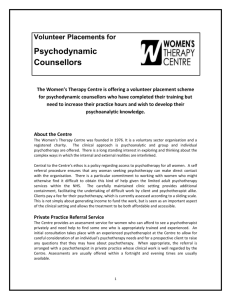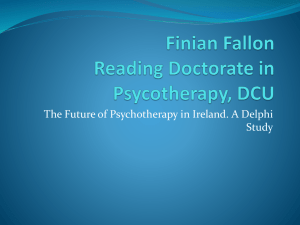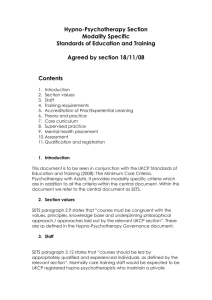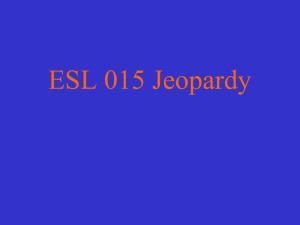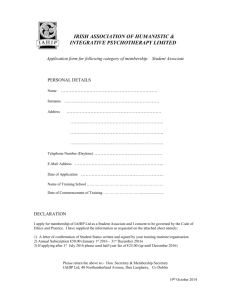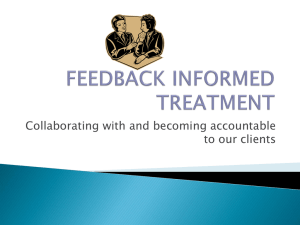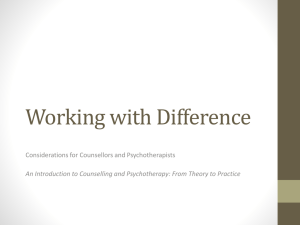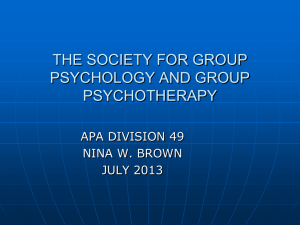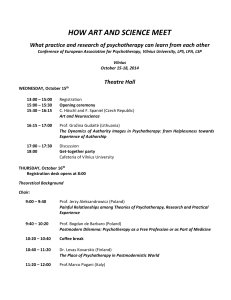Interim Psychotherapist Scope of Practice Consultation
advertisement
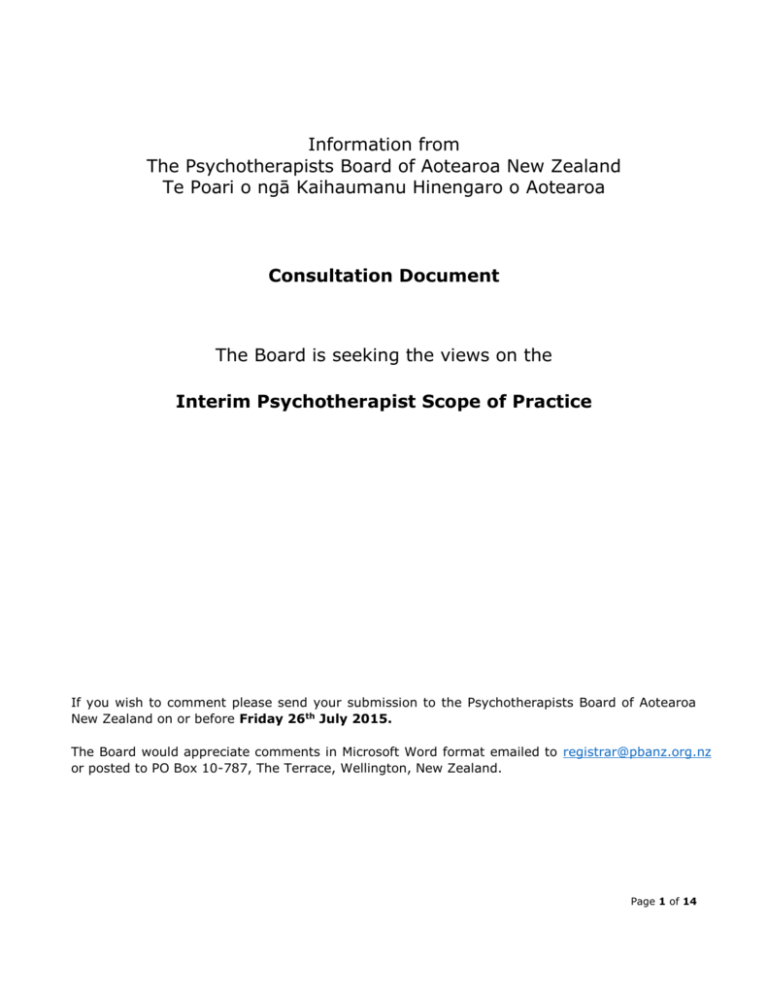
Information from The Psychotherapists Board of Aotearoa New Zealand Te Poari o ngā Kaihaumanu Hinengaro o Aotearoa Consultation Document The Board is seeking the views on the Interim Psychotherapist Scope of Practice If you wish to comment please send your submission to the Psychotherapists Board of Aotearoa New Zealand on or before Friday 26th July 2015. The Board would appreciate comments in Microsoft Word format emailed to registrar@pbanz.org.nz or posted to PO Box 10-787, The Terrace, Wellington, New Zealand. Page 1 of 14 Contents What is a scope of practice? ................................................................................................. 3 The purpose of this document .............................................................................................. 3 Interim Psychotherapist Scope of Practice ............................................................................. 3 Background ....................................................................................................................... 3 Proposed changes to the wording of the Interim Psychotherapist Scope of Practice ..................... 5 Feedback ........................................................................................................................... 8 Questions .......................................................................................................................... 9 Appendix One .................................................................................................................. 10 Notice of Scopes of Practice and Related Qualifications Prescribed by The Psychotherapists Board of Aotearoa New Zealand ...................................................... 10 Appendix Two .................................................................................................................. 13 General Consultation Information .............................................................................. 13 Page 2 of 14 Interim Psychotherapist Scope of Practice Consultation What is a scope of practice? A scope of practice describes and defines the boundaries of practise for a psychotherapist. Section 11 of the Health Practitioners Competence Assurance Act 2003 (HPCAA) sets out how scopes of practice must be prescribed by the Board. The purpose of this document To consult on changes to the Interim Psychotherapist Scope of Practice wording. This consultation is being undertaken in accordance with section 14 of the HPCAA. The Psychotherapist Scope of Practice and Psychotherapist Scope of Practice with Child and Adolescent Specialism will remain unchanged. Background Under section 118 of the Health Practitioners Competence Assurance Act 2003 (HCPAA) the Board is required to prescribe the scopes of practice which psychotherapists are permitted to perform. The Board has prescribed three broad scopes of practice: 1. Psychotherapist Scope of Practice 2. Psychotherapist Scope of Practice with Child and Adolescent Specialism 3. Interim Psychotherapist Scope of Practice These scopes as Gazetted are included as appendix one. The Interim Psychotherapist Scope of Practice was designed to protect the public by providing a scope of practice for psychotherapists who have not yet met the following requirements: 1. completed 900 hours of supervised clinical psychotherapy practice with clients over at least three years with clinical supervision provided by a psychotherapist registered in the Psychotherapist Scope of Practice or Psychotherapist Scope of Practice with Child and Adolescent Specialism; and/or 2. undergone a personal psychotherapy; and/or 3. completed a final assessment accredited or set by the Board. Since registration began in October 2008 the Board has had a clear policy that: acceptance into the Interim Psychotherapist Scope of Practice must be for the purpose of achieving registration in either the Psychotherapist Scope of Practice or the Psychotherapist Scope of Practice with Child and Adolescent Psychotherapist Specialism. practitioners can only remain in the Interim Psychotherapist Scope of Practice for a period of 5 years. This Board discussed the 5 year time limit at length before it was set and maintain that it is both necessary to protect the public and sufficient to be able to meet the requirements to move into either the Psychotherapist Scope of Practice or the Psychotherapist Scope of Practice with Child and Adolescent Page 3 of 14 Specialism. The Board periodically reviews the five year time limit; which remains unchanged since 2008. The Board has taken a proactive approach to the 5 year time limit by: 1. notifying practitioners of this requirement at time of registration; 2. requiring practitioners to acknowledge that they are actively working towards the Board’s policy during their APC renewal; 3. advertising the Board’s policy on its website; 4. placing reminders in Board newsletters; 5. sending reminders to individual practitioners. While the Board’s approach is proactive, psychotherapists are reminded that the onus to complete the Board requirements to move to either the Psychotherapist Scope of Practice or the Psychotherapist Scope of Practice with Child and Adolescent Specialism within 5 years remains with the individual psychotherapist. The Board is now seeking the view of the profession and stakeholders on: Including the 5 year time limitation within the Interim Psychotherapist Scope of Practice wording. Page 4 of 14 Proposed changes to the wording of the Interim Psychotherapist Scope of Practice The Board is proposing to amend the Interim Psychotherapists Scope of Practice by including the following sentence (in red) in the Interim Psychotherapist Scope of Practice. The five year time limitation applies to all psychotherapists registered within the Interim Psychotherapist Scope of Practice. The proposed wording will increase transparency, clarity and ensure that all psychotherapists are aware of their responsibilities. Please note that the Board does not have any Notice of Scopes of Practice and Psychotherapists Board of Aotearoa New Pursuant to sections 11 and 12 of the Health Act”), the following notice is given. input to the layout and font of a Gazette notice. Related Qualifications Prescribed by The Zealand Practitioners Competence Assurance Act 2003 (“the Notice 1. Title and commencement—(1) Notice of Scopes of Practice and Related Qualifications Prescribed by The Psychotherapists Board of Aotearoa New Zealand. (2) This notice comes into force on 10 January 2013. 2. Revocation—This notice revokes and replaces all previous scopes of practice and qualifications prescribed by The Psychotherapists Board of Aotearoa New Zealand. Scopes of Practice for Psychotherapists as at 10 January 2013. 1. Psychotherapist Scope of Practice 2. Psychotherapist Scope of Practice with Child and Adolescent Psychotherapist Specialism 3. Interim Psychotherapist Scope of Practice 1. Psychotherapist Scope of Practice Psychotherapists shall be competent to use various methods of psychotherapy to assist clients in their personal growth, relationship development, psychological life issues and mental health problems, whilst taking into consideration the bicultural context of Aotearoa New Zealand. Clients may include children, adolescents, adults, couples, families, whānau, groups, organisations and the public. A key element of psychotherapy is the therapeutic use of the relationship between the psychotherapist and client. Psychotherapy may involve, but is not limited to: Exploring the origins, maintenance and change of life patterns; the assessment, formulation, diagnosis and treatment of mental health problems; and working with patterns of psychological life which may be outside of conscious awareness, including non-verbal and preverbal patterns. Various coherent theoretical models are used in psychotherapy. In practising psychotherapy, the context of a person’s life needs to be taken into account, including social, cultural and spiritual contexts. Practice includes all the roles that a psychotherapist may assume such as clinical practice, educating and consulting including clinical supervision. Psychotherapists shall practise within their area and level of expertise and with due regard to ethical, legal and board-prescribed standards. Page 5 of 14 Prescribed Qualifications for Psychotherapist Scope of Practice An approved Master’s level qualification in psychotherapy from a New Zealand university or a New Zealand training institution or an approved comparable qualification OR Satisfactory completion of a final assessment accredited or set by the board AND The completion of 900 hours of supervised clinical psychotherapy practice with clients over at least three years with clinical supervision provided by a psychotherapist registered in the Psychotherapist Scope of Practice. Hours not completed during qualification may be completed post qualification AND The completion of 120 hours of personal psychotherapy with a registered psychotherapist during and/or following qualification. 2. Psychotherapist Scope of Practice with Child and Adolescent Psychotherapist Specialism Those working within this scope of practice are also able to work within the Psychotherapist Scope of Practice as long as they practise within their area and level of expertise and with due respect to the ethical, legal and board-prescribed standards. Child and adolescent psychotherapists shall be competent to use various methods of psychotherapy to assist children and adolescents with their psychological life issues and mental health problems, whilst taking into consideration the bicultural context of Aotearoa New Zealand. A key dimension of psychotherapy with children and adolescents is the use of developmentally appropriate methods. Child and adolescent psychotherapists are expected to have in-depth understanding of infant, child and adolescent development; infancy, childhood and adolescent disorders; family and cultural dynamics; and interdisciplinary approaches to working with children. Child and adolescent psychotherapists are specifically expected to be able to use methods of communication that are consistent with the child’s or adolescent’s stage of development and comprehension and be able to understand a child’s non-verbal communication. Psychotherapy with children and adolescents may involve, but is not limited to: The assessment, formulation, diagnosis and treatment of emotional and psychological distress; severe mental health problems; and working with patterns of psychological life which may be outside of conscious awareness. In practising psychotherapy, the context of a child or adolescent’s life and social environment needs to be taken into account. Child and adolescent psychotherapists are expected to be able to work with parents/caregivers, and/or family groups as an adjunct to their work with children or adolescents. Practice includes all the roles that a psychotherapist may assume such as clinical practice, educating and consulting including clinical supervision. Child and adolescent psychotherapists shall practise within their area and level of expertise and with due regard to the ethical, legal, and board-prescribed standards. Prescribed Qualifications for Psychotherapist Scope of Practice with Child and Adolescent Psychotherapist Specialism An approved Masters level qualification in child psychotherapy from a New Zealand university or an approved comparable qualification OR Page 6 of 14 Satisfactory completion of a final assessment accredited or set by the board AND The completion of 900 hours of supervised clinical child and adolescent therapeutic practice over at least three years with clinical supervision provided by a psychotherapist registered in the Psychotherapist Scope of Practice with Child and Adolescent Psychotherapist Specialism. Hours not completed during qualification may be completed post qualification. AND The completion of 120 hours of personal psychotherapy with a registered psychotherapist during and/or following qualification. 3. Interim Psychotherapist Scope of Practice Psychotherapists shall be competent to use various methods of psychotherapy to assist clients in their personal growth, relationship development, psychological life issues and mental health problems, whilst taking into consideration the bicultural context of Aotearoa New Zealand. Clients may include children, adolescents, adults, couples, families, whānau, groups, organisations and the public. A key element of psychotherapy is the therapeutic use of the relationship between the psychotherapist and client. Psychotherapy may involve, but is not limited to: Exploring the origins, maintenance and change of life patterns; the assessment, formulation, diagnosis and treatment of mental health problems; and working with patterns of psychological life which may be outside of conscious awareness, including non-verbal and preverbal patterns. Various coherent theoretical models are used in psychotherapy. In practising psychotherapy, the context of a person’s life needs to be taken into account, including social, cultural and spiritual contexts. Practice includes all the roles that a psychotherapist may assume such as clinical practice, educating and consulting including clinical supervision Psychotherapists shall practise within their area and level of expertise and with due regard to ethical, legal and board-prescribed standards. Acceptance into the Interim Psychotherapist Scope of Practice is for the purpose of achieving registration in either the Psychotherapist Scope of Practice or the Psychotherapist Scope of Practice with Child and Adolescent Psychotherapist Specialism. Save for in exceptional circumstances as determined by the Board, practitioners can only remain in the Interim Psychotherapist Scope of Practice for a maximum period of 5 consecutive years. The 5 year time limit begins from the date of registration and continues uninterrupted. Prescribed Qualifications for Interim Psychotherapist Scope of Practice An approved Master’s level qualification in psychotherapy and/or child psychotherapy from a New Zealand university or a New Zealand training institution or an approved comparable qualification OR Satisfactory completion of an initial assessment accredited or set by the board Page 7 of 14 Note: 1. A practitioner with an Interim Psychotherapist Scope of Practice must meet the required qualifications for the Interim Psychotherapist Scope of Practice. However, they may not have yet completed 900 hours of supervised clinical psychotherapy practice with clients over at least three years with clinical supervision provided by a psychotherapist registered in the Psychotherapist Scope of Practice or Psychotherapist Scope of Practice with Child and Adolescent Psychotherapist Specialism. Hours not completed during qualification may be completed post qualification. AND/OR 2. May not have completed 120 hours of personal psychotherapy with a registered psychotherapist during and/or following qualification. 2. Acceptance in this scope must be for the purpose of achieving registration in either the Psychotherapist Scope of Practice or the Psychotherapist Scope of Practice with Child and Adolescent Psychotherapist Specialism. Exceptional Circumstances The Board will retain the discretion, on a case by case basis and in exceptional circumstances only, to extend the five year time limit. Practitioners will be required to write to the Board outlining their circumstances and setting out the reasons, rationale and supporting documentation. What happens to practitioners who cannot meet the 5 year time limit? The Board will assess this on a case by case basis. Practitioners who can provide evidence that they will meet the Board’s requirements within an additional limited timeframe will not be issued with an Annual Practising Certificate (under section 25 (5)) but may, at the Board’s discretion, be granted an interim practising certificate under section 29 (7). An interim practising certificate is issued for a limited time period and will allow practitioners to continue working to meet Board requirements. Practitioners without exceptional circumstances will not be issued with an Annual Practicing Certificate (section 29 (5)) to practise in the Interim Psychotherapists Scope of Practice. These practitioners will have two options: Remove their name from the Register of psychotherapists. Retain their name on the Register of psychotherapists as a non-practising psychotherapist. Note: 1. Practitioners can reapply for registration once they can provide evidence that they meet the requirements to be registered in either the Psychotherapist Scope of Practice or Psychotherapist Scope of Practice with Child and Adolescent Psychotherapist Specialism. 2. Practitioners who remain on the Register as a non-practicing psychotherapist will not be able to practice psychotherapy as a psychotherapist (or to anything that breaches section 7 of the HPCAA). Page 8 of 14 Feedback The Board values feedback so please include any suggestions or alternative solutions/wording with your submission along with the accompanying rationale. The Board has allocated 8 weeks to respond to this consultation. This will allow individuals and groups time to attend meetings and provide considered feedback. If you wish to comment please send your submission to the Psychotherapists Board of Aotearoa New Zealand on or before Friday 26th July 2015. The Board would appreciate comments in Microsoft Word format emailed to registrar@pbanz.org.nz or posted to PO Box 10-787, The Terrace, Wellington, New Zealand. Questions 1. Do you wish to comment on the Board’s proposal to include the 5 year time limit in the wording of the Interim Scope of Practice? 2. Do you have any comment on the proposed wording? 3. Do you have any other comments? Page 9 of 14 Appendix One Notice of Scopes of Practice and Related Qualifications Prescribed by The Psychotherapists Board of Aotearoa New Zealand Pursuant to sections 11 and 12 of the Health Practitioners Competence Assurance Act 2003 (“the Act”), the following notice is given. Notice 1. Title and commencement—(1) Notice of Scopes of Practice and Related Qualifications Prescribed by The Psychotherapists Board of Aotearoa New Zealand. (2) This notice comes into force on 10 January 2013. 2. Revocation—This notice revokes and replaces all previous scopes of practice and qualifications prescribed by The Psychotherapists Board of Aotearoa New Zealand. Scopes of Practice for Psychotherapists as at 10 January 2013. 1. Psychotherapist Scope of Practice 2. Psychotherapist Scope of Practice with Child and Adolescent Psychotherapist Specialism 3. Interim Psychotherapist Scope of Practice 1. Psychotherapist Scope of Practice Psychotherapists shall be competent to use various methods of psychotherapy to assist clients in their personal growth, relationship development, psychological life issues and mental health problems, whilst taking into consideration the bicultural context of Aotearoa New Zealand. Clients may include children, adolescents, adults, couples, families, whānau, groups, organisations and the public. A key element of psychotherapy is the therapeutic use of the relationship between the psychotherapist and client. Psychotherapy may involve, but is not limited to: Exploring the origins, maintenance and change of life patterns; the assessment, formulation, diagnosis and treatment of mental health problems; and working with patterns of psychological life which may be outside of conscious awareness, including non-verbal and preverbal patterns. Various coherent theoretical models are used in psychotherapy. In practising psychotherapy, the context of a person’s life needs to be taken into account, including social, cultural and spiritual contexts. Practice includes all the roles that a psychotherapist may assume such as clinical practice, educating and consulting including clinical supervision. Psychotherapists shall practise within their area and level of expertise and with due regard to ethical, legal and board-prescribed standards. Prescribed Qualifications for Psychotherapist Scope of Practice An approved Master’s level qualification in psychotherapy from a New Zealand university or a New Zealand training institution or an approved comparable qualification OR Satisfactory completion of an assessment accredited or set by the board AND The completion of 900 hours of supervised clinical psychotherapy practice with clients over at least three years with clinical supervision provided by a psychotherapist registered in the Psychotherapist Scope of Practice. Hours not completed during qualification may be completed post qualification AND The completion of 120 hours of personal psychotherapy with a registered psychotherapist during and/or following qualification. Page 10 of 14 2. Psychotherapist Scope of Practice with Child and Adolescent Psychotherapist Specialism Those working within this scope of practice are also able to work within the Psychotherapist Scope of Practice as long as they practise within their area and level of expertise and with due respect to the ethical, legal and board-prescribed standards. Child and adolescent psychotherapists shall be competent to use various methods of psychotherapy to assist children and adolescents with their psychological life issues and mental health problems, whilst taking into consideration the bicultural context of Aotearoa New Zealand. A key dimension of psychotherapy with children and adolescents is the use of developmentally appropriate methods. Child and adolescent psychotherapists are expected to have in-depth understanding of infant, child and adolescent development; infancy, childhood and adolescent disorders; family and cultural dynamics; and interdisciplinary approaches to working with children. Child and adolescent psychotherapists are specifically expected to be able to use methods of communication that are consistent with the child’s or adolescent’s stage of development and comprehension and be able to understand a child’s non-verbal communication. Psychotherapy with children and adolescents may involve, but is not limited to: The assessment, formulation, diagnosis and treatment of emotional and psychological distress; severe mental health problems; and working with patterns of psychological life which may be outside of conscious awareness. In practising psychotherapy, the context of a child or adolescent’s life and social environment needs to be taken into account. Child and adolescent psychotherapists are expected to be able to work with parents/caregivers, and/or family groups as an adjunct to their work with children or adolescents. Practice includes all the roles that a psychotherapist may assume such as clinical practice, educating and consulting including clinical supervision. Child and adolescent psychotherapists shall practise within their area and level of expertise and with due regard to the ethical, legal, and board-prescribed standards. Prescribed Qualifications for Psychotherapist Scope of Practice with Child and Adolescent Psychotherapist Specialism An approved Masters level qualification in child psychotherapy from a New Zealand university or an approved comparable qualification OR Satisfactory completion of an assessment accredited or set by the board AND The completion of 900 hours of supervised clinical child and adolescent therapeutic practice over at least three years with clinical supervision provided by a psychotherapist registered in the Psychotherapist Scope of Practice with Child and Adolescent Psychotherapist Specialism. Hours not completed during qualification may be completed post qualification. AND The completion of 120 hours of personal psychotherapy with a registered psychotherapist during and/or following qualification. 3. Interim Psychotherapist Scope of Practice Psychotherapists shall be competent to use various methods of psychotherapy to assist clients in their personal growth, relationship development, psychological life issues and mental health problems, whilst taking into consideration the bicultural context of Aotearoa New Zealand. Clients may include children, adolescents, adults, couples, families, whānau, groups, organisations and the public. A key element of psychotherapy is the therapeutic use of the relationship between the psychotherapist and client. Psychotherapy may involve, but is not limited to: Exploring the origins, maintenance and change of life patterns; the assessment, formulation, diagnosis and treatment of mental health problems; and working with patterns of psychological life which may be outside of Page 11 of 14 conscious awareness, including non-verbal and preverbal patterns. Various coherent theoretical models are used in psychotherapy. In practising psychotherapy, the context of a person’s life needs to be taken into account, including social, cultural and spiritual contexts. Practice includes all the roles that a psychotherapist may assume such as clinical practice, educating and consulting including clinical supervision Psychotherapists shall practise within their area and level of expertise and with due regard to ethical, legal and board-prescribed standards. Prescribed Qualifications for Interim Psychotherapist Scope of Practice An approved Master’s level qualification in psychotherapy and/or child psychotherapy from a New Zealand university or a New Zealand training institution or an approved comparable qualification OR Satisfactory completion of an assessment accredited or set by the board Note: 1. A practitioner with an Interim Psychotherapist Scope of Practice must meet the required qualifications for the Interim Psychotherapist Scope of Practice. However, they may not have yet completed 900 hours of supervised clinical psychotherapy practice with clients over at least three years with clinical supervision provided by a psychotherapist registered in the Psychotherapist Scope of Practice or Psychotherapist Scope of Practice with Child and Adolescent Psychotherapist Specialism. Hours not completed during qualification may be completed post qualification. AND/OR May not have completed 120 hours of personal psychotherapy with a registered psychotherapist during and/or following qualification. 2. Acceptance in this scope must be for the purpose of achieving registration in either the Psychotherapist Scope of Practice or the Psychotherapist Scope of Practice with Child and Adolescent Psychotherapist Specialism. Page 12 of 14 Appendix Two General Consultation Information The Psychotherapists Board of Aotearoa New Zealand (the Board) is committed to open, transparent and consistent consultation when reviewing or developing standards, guidelines and related policies for dissemination to the public, profession and stakeholders. The Board will also consult to meet its common law obligations and obligations under section 14 of the Health Practitioners Competence Assurance Act 2003 (HPCAA). Consultation means that the Board will seek information and or advice and will consider it when making a decision. Consultation does not mean that the Board will abrogate its responsibility to make decisions consistent with its purpose and functions under the HPCAA. a) Benefits of Consultation The Board recognises that open consultation has many benefits, some of which are: enables stakeholders to contribute to policy development; facilitates working dialogue with internal and external stakeholders; helps early identification of potential problems and issues with proposed standards, guidelines and related policies; assists to make the process of developing standards, guidelines and related polices accountable; increases public and stakeholder understanding of the role and functions of the Board. b) How the Board will consult Consultation will usually be undertaken for a period of 8 weeks allowing sufficient time for consideration by the profession, public and stakeholders. consultation papers will be available for downloading from the Board’s website on the ‘News and Events’ page; consultation will be promoted to the Board’s practitioner and stakeholder database as well as in the Board’s newsletter and through the Board’s website; submissions received by practitioners or stakeholders will be acknowledged on receipt; the Board will determine on a case-by-case basis, the appropriateness and desirability of public and stakeholder face to face consultation meetings. c) The Board’s decision-making The Board in its decision-making process will consider, without limitation, the following: all feedback received during the consultation process; its primary purpose under the HPCAA which is ‘to protect the health and safety of members of the public by providing for mechanisms to ensure that health practitioners are competence and fit to practise their professions’. d) Board commitments The Board has made a commitment to ensure that issues of diversity and equality are valued, upheld and promoted, and underpin all aspects of the Board's work and therefore to being familiar with, and operating according to the: Principles of natural justice and administrative law Te Tiriti o Waitangi Page 13 of 14 Health and Disability Commissioner Act 1994 - Code of Health and Disability Services Consumers' Rights Health and Disability Services Act 1993 Privacy Act 1993 - Health Information Privacy Code 1994 Human Rights Act 1993 Page 14 of 14
